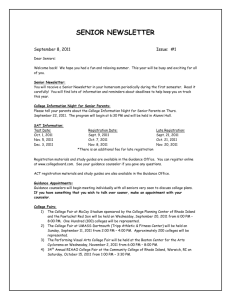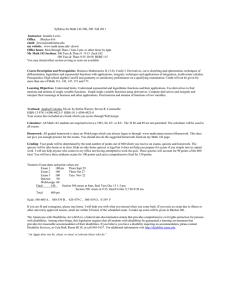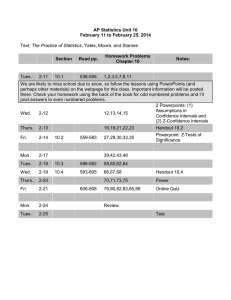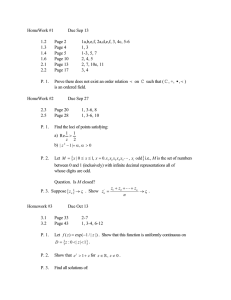BIOLOGICAL SCIENCES II Course Policies, Procedures, and Syllabus
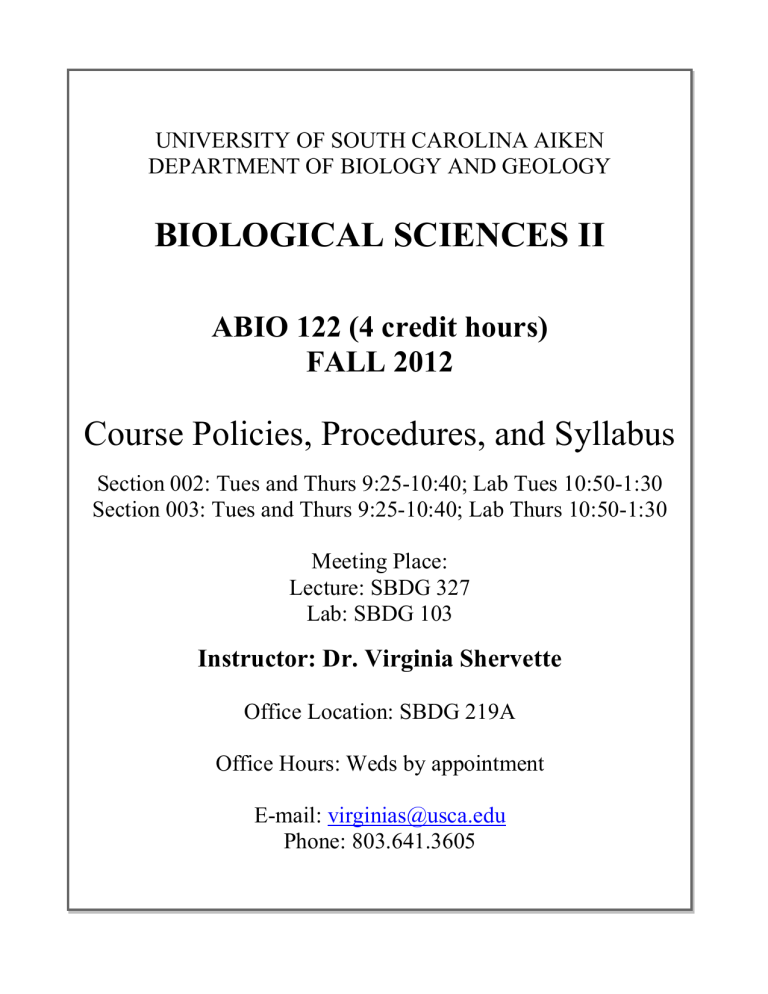
UNIVERSITY OF SOUTH CAROLINA AIKEN
DEPARTMENT OF BIOLOGY AND GEOLOGY
BIOLOGICAL SCIENCES II
ABIO 122 (4 credit hours)
FALL 2012
Course Policies, Procedures, and Syllabus
Section 002: Tues and Thurs 9:25-10:40; Lab Tues 10:50-1:30
Section 003: Tues and Thurs 9:25-10:40; Lab Thurs 10:50-1:30
Meeting Place:
Lecture: SBDG 327
Lab: SBDG 103
Instructor: Dr. Virginia Shervette
Office Location: SBDG 219A
Office Hours: Weds by appointment
E-mail: virginias@usca.edu
Phone: 803.641.3605
TEXTBOOK and LAB MATERIALS
Required Text: Biology (9 th
ed.), Raven, Johnson, Losos, Mason & Singer (or the 8th edition of Raven & Johnson)
Lab manual: Biology Laboratory Manual, Department of Biology & Geology (Required)
A Photographic Atlas for the Biology Laboratory, Van de Graff & Crawley (optional)
LAB SUPPLIES: A quad-ruled notebook is required. Surgical gloves are recommended for use with handling preserved specimens. Each student must provide his/her own eye protection and gloves when working with preserved specimens. (Caution: Exposure to formaldehyde has been linked to cancer in rats.)
COURSE OBJECTIVES and LEARNING OUTCOMES
COURSE DESCRIPTION: Biological principles and concepts from the tissue through ecosystem levels of organization including evolutionary processes.
COURSE OBJECTIVES:
•
To acquaint students with biological principles associated with multicellularity, development, phylogeny, ecology and evolution.
•
To acquaint students with the anatomical organization of organisms to include tissue, organs, and systems and their functions.
•
To trace the development of organisms.
•
To trace the phylogeny of organisms.
•
To acquaint students with the behavior and ecology of organisms.
STUDENT COMPETENCY STATEMENTS: By the end of this course the student will have demonstrated the ability to:
•
Discuss biological principles and topics of historical and current interest and importance.
•
Describe the biological processes that operate at the multicellular levels to include histological, organismal, population, community and ecosystem levels of organization.
•
Apply theoretical concepts in the laboratory by following a written procedure.
METHODS OF PRESENTATION: This course will consist of lectures by the instructors, lecture videos, classroom discussion, and group and individual laboratory exercises. The instructors will utilize appropriate modes of visual aids and laboratory equipment.
METHODS OF EVALUATION: Achievement of course objectives will be evaluated by lecture exams, laboratory reports, notebooks, quizzes and exams, and a final comprehensive exam.
COURSE GRADING and EXAMS
The lecture will count for 50% and the lab for 50% of the final course grade. However, you must receive a passing grade in lab to pass the class.
G rades in the course will be determined as follows:
10% - weekly laboratory quizzes
10% - lab notebooks
10% - 2 laboratory reports
20% - 2 laboratory exams
36% - 3 lecture quizzes
14% - final comprehensive exam
See the course schedule below for dates of lecture exams, lab exams and final exam.
ATTENDANCE and PARTICIPATION
1.
This is a survey course and covers a great deal of material! The text is good and can help explain lecture material you may not fully understand. I will not cover all of the text in class, but you will understand lectures better if you read the assigned text sections before you come to class , and you will do better on tests if you keep up with the reading. In addition, I will provide information in lecture that will supplement your text. You will be expected to know this additional material for lecture quizzes, so it is imperative that you attend lectures to do well in this class.
2.
The lab is heavily scheduled and you will be expected to stay for the entire period.
3.
You will be expected to have read all laboratory exercises and the accompanying text references before attending labs. You must bring both your laboratory manual and your text to the laboratory.
4.
No make-up exams will be given for missed lecture quizzes except under extreme situations (see your Student
Handbook). There will be no opportunity to make up missed lab quizzes or exams unless it can be arranged during another lab period during the week the absence occurred.
5.
Students are expected to attend lectures. Pop quizzes may be given periodically to encourage attendance. In addition, 75% attendance in lab is required. You cannot get a passing grade in lab with more than three absences and you cannot pass the course if you do not pass the lab.
6.
You are strongly encouraged to make appointments with your instructor if you are having problems in the course. You may make an appointment or drop in if I am not busy with another student.
7.
Upon prior approval, you will be allowed to use an electronic device to record lectures if the recording device is placed at the front lecture desk. However, the use of any other portable electronic devices, including cell phones, pagers, MP3 players, iPods, etc., during class or lab is not permitted. If you have any of these devices in your possession during class, they must be turned off and stowed away for the duration of the class period.
8.
If you have a physical, psychological, and/or learning disability which might affect your performance in this class, please contact the Office of Disability Services, 134 B&E, (803) 643-6816, as soon as possible. The
Disabilities Services Office will determine appropriate accommodations based on documentation.
HONOR CODE AND CHEATING
HONOR CODE: In our hearts we know that cheating is wrong. It is the responsibility of every student at the
University of South Carolina Aiken to adhere steadfastly to truthfulness and to avoid dishonesty, fraud, or deceit of any type in connection with any academic program. Any student who violates this Honor Code or who knowingly assists another to violate this Honor Code shall be subject to discipline.
By signing your name to an assignment, quiz, or test you are acknowledging that you will adhere to The Honor Code at USCA. This class is designed to benefit you, the student.
Please do not allow yourself to succumb to any form of cheating. Suspicion of cheating will be reported automatically to Academic Integrity. Cheating on an Exam will result in an F in the course.
Date
23 Aug Thurs
28 Aug Tues
30 Aug Thurs
4 Sep Tues
6 Sep Thurs
11 Sep Tues
13 Sep Thurs
18 Sep Tues
20 Sep Thurs
25 Sep Tues
27 Sep Thurs
2 Oct Tues
4 Oct Thurs
9 Oct Tues
11 Oct Thurs
16 Oct Tues
18 Oct Thurs
23 Oct Tues
25 Oct Thurs
30 Oct Tues
1 Nov Thurs
6 Nov Tues
8 Nov Thurs
13 Nov Tues
15 Nov Thurs
20 Nov Tues
22 Nov Thurs
27 Nov Tues
29 Nov Thurs
4 Dec Tues
6 Dec Thurs
11 Dec Tues
Lecture Schedule
Topic
Introduction to Class; The Evidence for Evolution
The Evidence for Evolution continued; Origin of Species
Origin of Species continued; Genes within Populations
Genes within Populations; Systematics and Phylogenetic
Catch-up and Review
Exam 1
The Tree of Life
Prokaryotes
Protists
Fungi
Green Plants
Plants Form and Function
Animal Development
Exam 2
Overview of Animal Diversity
Noncoelomate Invertebrates; Coelomate Invertebrates
NO CLASS (Fall Break)
Invertebrates continued; Vertebrates
Vertebrates continued
Animal Body and Principles of Regulation
The Reproductive System
NO CLASS (Election Day)
Make-up day in case we got behind
Exam 3
Behavioral Biology
Ecology of Individuals and Populations
NO CLASS (Thanksgiving Break)
Community Ecology
Dynamics of Ecosystems
The Biosphere
Conservation Biology
Final Exam 8 am
Chapter
21
21 and 22
22 and 20
20 and 23
26
28
29
31
30
36 and 37
54
32
33 and 34
59
60
56
57
58
55
35
35
43
53
16 Oct
18 Oct
23 Oct
25 Oct
30 Oct
1 Nov
6 Nov
8 Nov
13 Nov
15 Nov
20 Nov
22 Nov
27 Nov
29 Nov
4 Dec
6 Dec
Date
28 Aug
30 Aug
4 Sep
6 Sep
11 Sep
13 Sep
18 Sep
20 Sep
25 Sep
27 Sep
2 Oct
4 Oct
9 Oct
11 Oct
LABORATORY SCHEDULE
Topic
Scientific Methods/ First Lab Report
Microscopy
Prokaryote and Protist Diversity
Cell Cycle, Division and Ploidy
*Start Group Project
Fungi Diversity
Plant Diversity
Monocots and Dicots; Plant Tissue
Flowers, Fruits and Seeds
*Group 1 project wraps up
NO LAB (study for Lab Exam)
Lab Exam 1
Animal Diversity 1 and 2
NO LAB
Vertebrate Diversity
Vertebrate tissue
NO LAB
Ecology: Trophic Pyramid
Lab Exam 2
Lab Exercise
I
II
III
VII
IV
V
VI
IX and X
XI
XII
ACKNOWLEDGMENT OF READING THE SYLLABUS
In your natural handwriting copy out the following statement in the space provided below:
I have read the ABIO 122 syllabus and understand the policies on lecture, lab, grading, exams, attendance, quizzes, honor code, and cheating. I have also read and understand the additional course information. While physically attending this class, I will act in a manner that is respectful to me, other students, the professor, and guest speakers.
Write out statement below:
Signature: _________________________________
Name printed:_______________________________
Date: ______________________
*You will not receive credit for this course until you have completed and turned in this acknowledgement.

